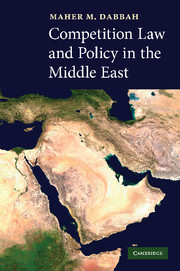Book contents
- Frontmatter
- Contents
- Preface
- List of abbreviations
- 1 Introduction
- 2 The relationship between Islam and competition law and policy
- 3 Israel: the region's oldest competition law
- 4 Turkey: a European dream from the other side of the border
- 5 The Arab Maghreb countries
- 6 Jordan's 2004 Competition Law
- 7 The Gulf States: a possible model for regional cooperation
- 8 The Arab Republic of Egypt: the chase after globalisation
- 9 Lebanon and Syria: a tale of two states
- 10 Conclusions
- Index
2 - The relationship between Islam and competition law and policy
Published online by Cambridge University Press: 20 July 2009
- Frontmatter
- Contents
- Preface
- List of abbreviations
- 1 Introduction
- 2 The relationship between Islam and competition law and policy
- 3 Israel: the region's oldest competition law
- 4 Turkey: a European dream from the other side of the border
- 5 The Arab Maghreb countries
- 6 Jordan's 2004 Competition Law
- 7 The Gulf States: a possible model for regional cooperation
- 8 The Arab Republic of Egypt: the chase after globalisation
- 9 Lebanon and Syria: a tale of two states
- 10 Conclusions
- Index
Summary
Twenty of the twenty-one MECs identified in the previous chapter are Muslim countries or countries with a Muslim majority in the population. Indeed, Israel – the only non-Muslim MEC – has a significant Muslim minority, which amounts to over 20 per cent of the population. There is therefore a clear Muslim majority in the Middle East as a whole and a clear, indeed strong association between Islam and MECs especially in light of the fairly strong Islamic culture and tradition prevailing in almost the whole of the region. The fact this is so makes it particularly interesting to consider whether ‘links’ exist between competition law and Islam, the Middle East's main religion.
This chapter examines the relationship between Islam and competition law and policy. In assessing this relationship, the chapter addresses several issues, which are an integral part of its subject matter. Among these are the role which competition law and policy play in a given system or economy and whether competition law and policy have any expression in Islam either as a past expression through the long history of the religion or as a present one.
The relationship: a myth or reality?
If one were to conduct a search – using a search engine such as Google – of the word ‘Islam’, over ninety four million results will be generated. Conducting a similar search using the term ‘competition law’ would generate about 43 million results.
- Type
- Chapter
- Information
- Competition Law and Policy in the Middle East , pp. 18 - 33Publisher: Cambridge University PressPrint publication year: 2007
- 1
- Cited by



